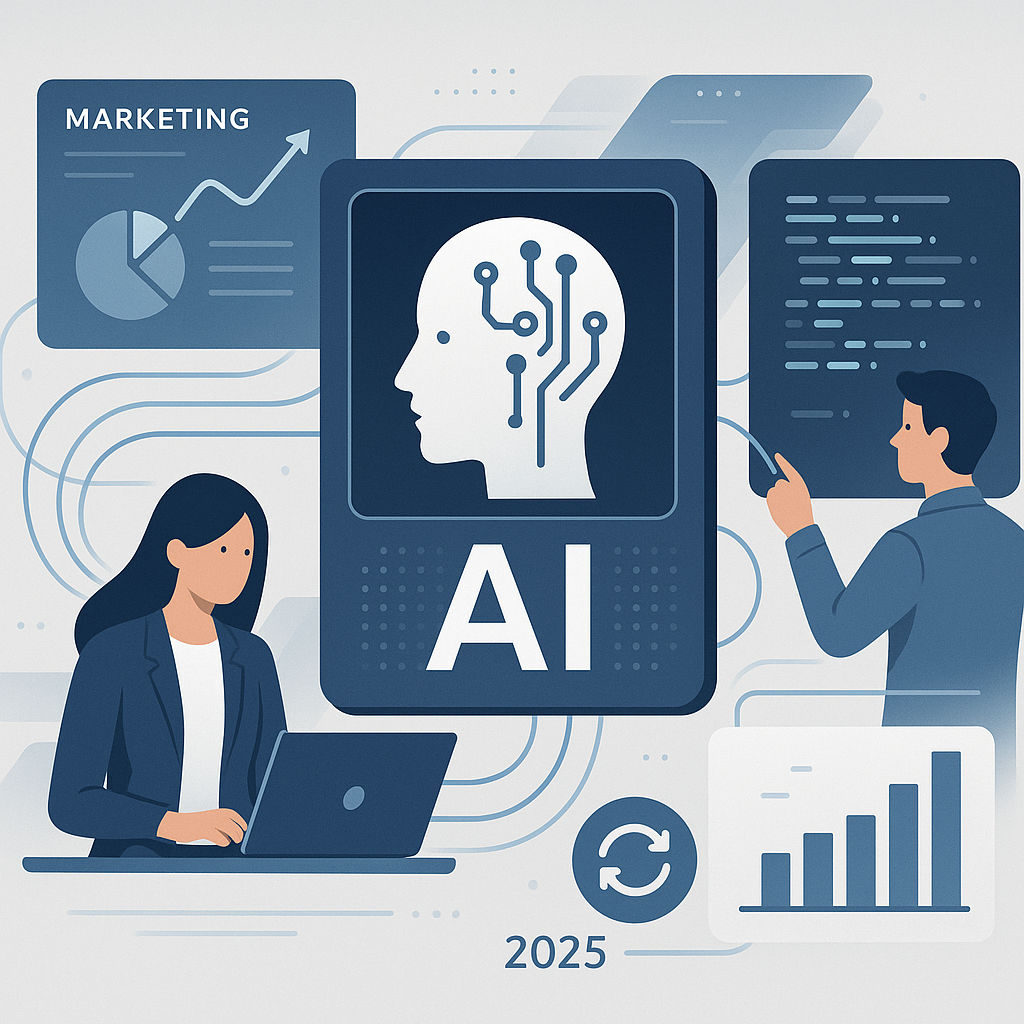
Leveraging AI to Revolutionize Marketing and Outsourcing in 2025
Introduction: The AI Paradigm Shift in Marketing and Software Outsourcing
In 2025, artificial intelligence (AI) has shifted from a novel concept to a core driver transforming marketing strategies and the landscape of custom software product development. Businesses worldwide are leveraging AI not just as a tool but as a critical enabler for gaining competitive advantage, particularly through application development outsourcing. This fusion of AI with marketing and software production introduces unprecedented capabilities affecting decision-making, customer engagement, and operational efficiency.
Marketing with Artificial Intelligence: Beyond Automation to Strategic Innovation
AI has redefined marketing from rote automation to advanced strategic innovation. Marketers harness AI-driven analytics to decode immense volumes of consumer data, revealing nuanced preferences and patterns that inform personalized campaigns. For example, AI-powered predictive models forecast buying behaviors with extraordinary precision, enabling marketers to craft timely, hyper-personalized outreach that resonates deeply with individual customers.
Machine learning algorithms optimize content distribution, targeting channels and moments where engagement peaks. Chatbots and conversational AI not only enhance customer service but provide continuous intelligence about client sentiments and needs. This real-time feedback loop allows agile marketing adjustments, transforming campaigns into living conversations rather than static promotions.
Creative Applications of AI in Marketing
- Dynamic Pricing Models: Retailers use AI to adjust prices dynamically based on competitor activity, demand spikes, and inventory levels.
- Sentiment Analysis for Brand Monitoring: Marketing teams deploy AI to analyze social media and public forums, detecting emerging brand perception issues early for proactive response.
- AI-Generated Content: Advanced natural language generation tools create tailored email campaigns and social media posts that align with brand voice but require minimal human drafting.
Custom Software Product Development Fueled by AI Insights
AI’s integration into custom software product development has catalyzed a transformation from traditional coding to intelligent, adaptive systems. AI-driven development tools now assist programmers by suggesting code completions, detecting bugs in real-time, and even generating functional modules from specifications.
Moreover, AI facilitates rapid prototyping and user behavior simulation, enabling developers to iterate products more efficiently based on predictive analytics about how users interact with software features. This anticipatory design reduces development cycles and increases product relevance and usability.
AI also improves the customization process itself by analyzing client needs deeply and proposing tailored solutions that go beyond generic templates — blending creativity with data-driven precision.
Examples of AI Supporting Custom Software Development
- Automated Code Review: AI-powered tools analyze codebases for potential security vulnerabilities and performance bottlenecks, streamlining quality assurance.
- User Experience Optimizers: AI simulates user interfaces to identify friction points before deployment, informing design improvements.
- Intelligent Testing Suites: Machine learning models generate test cases that cover edge scenarios often missed in manual testing.
Application Development Outsourcing: AI as a Catalyst for Strategic Partnership
Application development outsourcing has evolved into a strategic collaboration where AI tools enhance transparency, communication, and quality control. Outsourcing teams leverage AI platforms to manage workflows, predict project risks, and ensure alignment with client business goals.
AI also empowers outsourcing partners with intelligent resource allocation, automating task assignments based on individual expertise and project demands. This boosts team efficiency, mitigates delays, and adapts quickly to changing project scopes.
Furthermore, AI-driven analytics monitor outsourcing outcomes in real-time, allowing both clients and vendors to measure KPIs accurately and continuously optimize delivery processes.
How AI Reinforces Outsourcing Dynamics
- Enhanced Collaboration Tools: AI-driven platforms translate technical jargon and cultural nuances, reducing miscommunication between global teams.
- Predictive Project Management: Machine learning forecasts potential bottlenecks and resource shortages, enabling proactive interventions.
- Quality Assurance Automation: Continuous integration tools incorporate AI to automatically detect deviations from specifications during development cycles.
Cross-Disciplinary Benefits: AI Bridging Marketing and Software Delivery
One of the most interesting developments is how AI connects marketing insights with custom software capabilities via outsourced development processes. For instance, marketing data can directly inform product feature prioritization, ensuring development investments maximize market impact.
Conversely, AI-infused custom applications facilitate advanced marketing tactics such as real-time personalization, customer journey orchestration, and adaptive content delivery systems. This symbiotic relationship exemplifies AI’s role as a bridge between the technical and commercial domains, creating holistic solutions.
Case Study Snapshot: AI Amplifying Competitive Edge
Consider a mid-sized global retailer who outsourced mobile app development while adopting AI-powered marketing analytics. The AI insights revealed early-stage abandonment on the app’s onboarding flow, prompting the outsourced development team to redesign that user experience dynamically. Subsequent AI-driven marketing campaigns tailored to segmented user personas doubled retention rates over six months.
This case underscores how integrating AI across marketing and development outsourcing can yield transformative business outcomes that traditional approaches rarely achieve.
Looking Ahead: The Future Landscape of AI in Marketing and Software Outsourcing
As AI models increasingly evolve in sophistication through advancements in generative AI, reinforcement learning, and causal inference techniques, their role within marketing, custom software development, and outsourcing will deepen. Anticipated trends include fully autonomous development pipelines guided by AI and marketing ecosystems that dynamically adapt without human intervention.
Organizations embracing these innovations today position themselves not just as users of AI but as architects of a new digital economy defined by intelligent collaboration and hyper-personalized customer experiences.
Conclusion: AI as a Strategic Imperative for Competitive Growth
The convergence of marketing with artificial intelligence and the outsourcing of custom software product development presents a powerful strategic opportunity. By embedding AI throughout these processes, businesses unlock new levels of insight, agility, and efficiency that were previously unimaginable.
Those who strategically leverage AI to connect marketing intelligence with development execution will lead in delivering differentiated products and customer experiences, thereby securing sustainable competitive advantage as the digital landscape continues to evolve rapidly.




